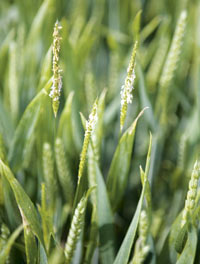Research shows growing blackgrass resistance to Atlantis

The findings of a random field survey conducted by Rothamsted Research last summer support the view that Atlantis performance is declining.
Testing of blackgrass seed samples collected from the same fields in 2002 and 2009 showed clear increases in resistance.
“There was substantially less blackgrass around in most of these fields in 2009 than 2002, which shows what a good job Atlantis (mesosulfuron-methyl + iodosulfuron-methyl-sodium) has done since it came onto the market,” comments weed scientist Stephen Moss.
“But in the 2002 samples we saw a high level of control across all the fields, while in 2009 there was clear evidence of resistance in four fields and marginal resistance in two others.”
Although just 12 random fields were sampled in 2009, the results are significant, he notes. “I believe they reflect the situation in typical arable fields across the country, as these fields were not sampled because of any complaint.
“This contrasts with testing done by agrochemical countries which tends to focus on fields with poor control, and therefore are not representative of fields at large.
“More random fields will be sampled in 2010. Our results give an indication of what’s been happening in the last six years as well as an insight into what’s to come.”
With a sizeable proportion of growers also reporting the first signs of reduced performance, Dr Moss sounds a note of caution about the future.
“The problem that growers are facing is the lack of an obvious replacement for Atlantis. As resistance to it increases and more fields are sampled, control levels will increasingly be compromised.”
The chief difficulty for cereal growers and consultants is knowing what to do when resistance has been confirmed, he continues.
“In many of the fields where we found Atlantis-resistant blackgrass, infestation levels were low. If resistance is present in such situations, is it best to carry on using Atlantis?
“Use of less effective alternatives may reduce selection pressure for Atlantis resistance, but simply allow blackgrass populations to increase. It’s a real conundrum, as coming to the correct decision is difficult, especially given the recent loss of alternative herbicides.”
Making more use of cultural control methods, better use of pre-emergence herbicides, employing alternative modes of action in break crops and easing up on the use of Atlantis wherever possible must be the way forward, he advises.
“The pre-emergence message is accepted by most growers now and we had good opportunity to get those applications right last autumn.”
Maximising control from Atlantis is vital, so avoid using it in marginal conditions, he urges. “One topical issue is the use of Atlantis in mixtures, where you risk losing some activity through antagonism. Avoiding tank mixes in the spring is tricky at a practical level, accepts Dr Moss.
He supports Bayer’s recent action in restricting tank-mix partners. “It’s important to avoid antagonistic mixtures. We don’t have IPU [isoproturon] and trifluralin to fill in the gaps any more.”
Cultural control methods also deserve serious consideration, although it’s hard to convince farmers of their merits, he continues. “I’m convinced that farmers will have to pay more attention to these as resistance increases.”

